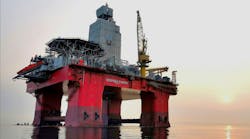Soon after the Organization of Petroleum Exporting Countries held its regular ministerial meeting Dec. 4 in Vienna, the usual question was asked: Does its decision to maintain the group's official production quota level at 30 million b/d even matter?
Non-OPEC production continues to rise. So does global demand, particularly in China, India, and other rapidly industrializing nations. Yet OPEC's deliberations every 6 months don't seem to carry the force they once did.
One reason may be that it may never have been that effective as a cartel despite the rude awakening consuming nations received when gasoline prices quickly doubled during the 1973 Arab oil embargo, according to one observer.
"The embargo itself affected only 2-4% of world supplies, and only for about 5 weeks," said Jeff D. Colgan, an assistant professor at American University's School of International Service, adding, "But it gave OPEC its reputation as a cartel. People saw a rapid price increase and inferred it was because supplies had been withdrawn."
Although OPEC was founded in 1960, production quotas weren't even instituted until 1982 after Saudi Arabia drove prices down to regain market share, Colgan told a group at Johns Hopkins University's School of Advanced International Studies.
But from 1982 to 2009, OPEC's aggregate quota was violated 96% of the time, and changes rarely led to adjustments, Colgan said, adding that Saudi Arabia apparently behaves strategically because of its spare capacity, but there isn't evidence it's ready to discipline other OPEC members.
'Rational myth'
"OPEC perpetuates the cartel idea as a rational myth to give its members more prestige," Colgan maintained, adding, "But the long-run oil price story reflects demand growth, not supply restrictions."
The group's having an impact at key moments has been a plausible story for politicians domestically as well as overseas, but the idea doesn't hold up on closer examination, Colgan said. "In the late 1970s, when Jimmy Carter had so many economic problems during his presidency, his advisors told him to blame OPEC," he noted.
Meanwhile, OPEC has become more of a political club than a cartel, Colgan said. It supports specific beliefs and ideas, it defies categorization, and its causal impact affects diplomatic behavior and little more, he indicated.
"Oil traders know OPEC isn't a cartel, but they pay attention to it in ways we might pay attention to the White House press secretary," he said. More troubling is why many government analysts haven't been more skeptical, he added.
"OPEC, in a sense, has taken on a life of its own," Colgan said. "It still tries to serve its members, but it's much diff different from what its founders intended."

